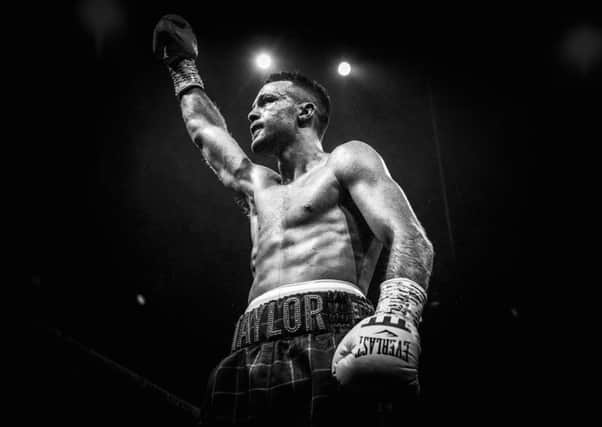Josh Taylor faces toughest task of his career against Regis Prograis


Both came to boxing in their mid -teens via martial arts. Taylor fought internationally in taekwondo, Prograis was a colour band shy of a black belt in karate. Taylor represented Britain at the London Olympics, Prograis fell at the American Olympic trials to Errol Spence, the unified WBC and IBF welterweight champion and arguably among the world’s top three pound-for-pound fighters.
Taylor won the IBF super lightweight title in his last bout, only his 15th as a pro, Prograis arrives at the 02 Arena in London on Saturday in possession of the WBA and WBC belts. Neither has tasted professional defeat. You might say there is a degree of anticipation about a contest that will transform the profile and prospects of the winner, catapulting him into the vanguard of boxing’s pay-per-view warrior class.
Advertisement
Hide AdAdvertisement
Hide AdThere is both respect and disdain for each other, depending on the level of emotional engagement at the time of questioning. Prograis loves the “chat-shit-get-banged” brogue of the all-American ’hood. In truth, there is more to him than gold chains and exposed pecs. Before the levees broke, washing away his home and community, Prograis was an elite high-school athlete with eyes on a college football scholarship.
Katrina put paid to that, forcing him back and forth across the Louisianna/Texas border before finally settling in Houston, where he picked up the boxing threads at the expense of all else. His attachment to New Orleans remains, however, etched in one of a number of tattoos across his torso alongside a series of numbers. “That’s the date my life changed (08-31-2005). At first, for the worst. But then, for the better.”
Katrina left a total of 1,833 dead and more than a million displaced. “When the storm hit, I was 16, in high school. Everybody had to leave town. The whole city flooded. The whole city was a lake. People were stuck in the city for two weeks without water and food. It was bad, really bad.”
Prograis’ father, Vidal, a hospital IT operator, recalls being unable to identify his home. “There was a tree in the garden, that was how I knew exactly where the house was. It was washed away. Inside all of the sports trophies Regis won as a kid, all gone. All you could see where the marks on the walls where the water had been. It was devastating. Everybody lost someone, family, friends. No-one escaped.”
Mercifully, the Firth of Forth is not vulnerable to tragic weather events. Prestonpans held more prosaic terrors, but terrors nonetheless for a wee boy growing up in an unforgiving post- industrial community. “I’ve been fighting all my life,” Taylor said. “I was never a bad kid getting into trouble, but being young and boys being boys. I have been hit with golf clubs, bottles, bricks. I was smaller than mostly everybody. They used to think I was easy pickings. They used to find out the hard way.”
The golf club was, he confesses, an accidental blow delivered by his cousin under tuition from him. “It smashed my jaw in 12 places. I was stood behind her. It was the follow-through. I had that ringing inside my head but I didn’t go down. So I know I have got a good chin.” It took 90 stitches and three months feeding through a straw to put him back together again. It remains the only blemish on a handsome face.
Taylor has been described by manager Barry McGuigan as Scotland’s finest since Ken Buchanan, who went toe to toe with the great Roberto Duran at Madison Square Garden. Since Duran has a fair shout to be considered the best lightweight in history, that was quite the perfomance 47 years ago, and a lofty bar to meet.
Prograis, 30, might be considered an approximation to Duran in his unrelenting, come-forward style, though with none of the rapier thrusts of Hands of Stone. Taylor, two years the junior, comes from the European tradition of jab and move and is only beginning to tap into his power range at world class. Prograis is the toughest engagement of his short career. The same can be said of Prograis, who allows that this is the fight that will make his name against an opponent he admits is “a tough kid”.
Advertisement
Hide AdAdvertisement
Hide AdSo parity of sorts in a match between equals. Taylor’s quiet confidence contrasts with the full-bore machismo of the American. “He has A lot to say for himself. Typical American trash talk. Talks a big game, bigs himself up, likes to believe his own hype,” said Taylor in summary. “He looks a good fighter, heavy handed, but nothing I can’t handle, and I see things I will be able to expose on fight night.”
This showdown is staged in the shadow of the tragic death of Patrick Day from injuries sustained in a Chicago ring just ten days ago. In his more reflective moments, Prograis speaks for all boxers when he balances the risk against the fulfilment and pride he feels every time he crosses the ropes. “Sometimes you think how dangerous this sport is. The point is to hurt your opponent. It’s like no other sport. You do think ‘damn why am I doing this?’ But I know why. Because I’m so good at it.”